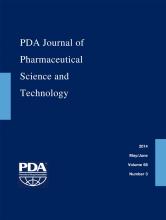Abstract
Extracts of plastic packaging, manufacturing, and delivery systems (or their materials of construction) are analyzed by chromatographic methods to establish the system's extractables profile. The testing strategy consists of multiple orthogonal chromatographic methods, for example, gas and liquid chromatography with multiple detection strategies. Although this orthogonal testing strategy is comprehensive, it is not necessarily complete and members of the extractables profile can elude detection and/or accurate identification/quantification. Because the chromatographic methods rarely indicate that some extractables have been missed, another means of assessing the completeness of the profiling activity must be established.
If the extracts are aqueous and contain no organic additives (e.g., pH buffers), then they can be analyzed for their total organic carbon content (TOC). Additionally, the TOC of an extract can be calculated based on the extractables revealed by the screening analyses. The measured and calculated TOC can be reconciled to establish the completeness and accuracy of the extractables profile. If the reconciliation is poor, then the profile is either incomplete or inaccurate and additional testing is needed to establish the complete and accurate profile.
Ten test materials and components of systems were extracted and their extracts characterized for organic extractables using typical screening procedures. Measured and calculated TOC was reconciled to establish the completeness of the revealed extractables profile. When the TOC reconciliation was incomplete, the profiling was augmented with additional analytical testing to reveal the missing members of the organic extractables profile. This process is illustrated via two case studies involving aqueous extracts of sterile filters.
LAY ABSTRACT: Plastic materials and systems used to manufacture, contain, store, and deliver pharmaceutical products are extracted and the extracts analyzed to establish the materials' (or systems') organic extractables profile. Such testing typically consists of multiple chromatographic approaches whose differences help to ensure that all organic extractables are revealed, measured, and identified. Nevertheless, this rigorous screening process is not infallible and certain organic extractables may elude detection. If the extraction medium is aqueous, the process of total organic carbon (TOC) reconciliation is proposed as a means of establishing when some organic extractables elude detection. In the reconciliation, the TOC of the extracts is both directly measured and calculated from the chromatographic data. The measured and calculated TOC is compared (or reconciled), and the degree of reconciliation is an indication of the completeness and accuracy of the organic extractables profiling. If the reconciliation is poor, then the extractables profile is either incomplete or inaccurate and additional testing must be performed to establish the complete and accurate profile. This article demonstrates the TOC reconciliation process by considering aqueous extracts of 10 different test articles. Incomplete reconciliations were augmented with additional testing to produce a more complete TOC reconciliation.
- Extractables
- Total organic carbon (TOC)
- Reconciliation
- Plastics
- Polymers
- Medical devices
- Packaging systems
- Manufacturing systems
- © PDA, Inc. 2014
PDA members receive access to all articles published in the current year and previous volume year. Institutional subscribers received access to all content. Log in below to receive access to this article if you are either of these.
If you are neither or you are a PDA member trying to access an article outside of your membership license, then you must purchase access to this article (below). If you do not have a username or password for JPST, you will be required to create an account prior to purchasing.
Full issue PDFs are for PDA members only.
Note to pda.org users
The PDA and PDA bookstore websites (www.pda.org and www.pda.org/bookstore) are separate websites from the PDA JPST website. When you first join PDA, your initial UserID and Password are sent to HighWirePress to create your PDA JPST account. Subsequent UserrID and Password changes required at the PDA websites will not pass on to PDA JPST and vice versa. If you forget your PDA JPST UserID and/or Password, you can request help to retrieve UserID and reset Password below.






